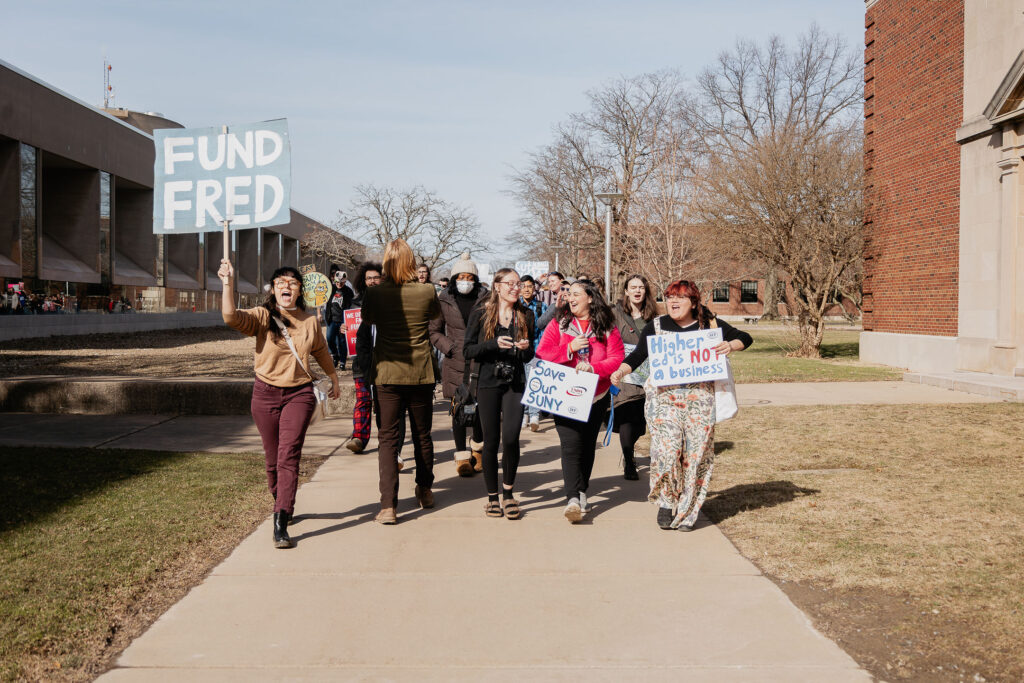DAN QUAGLIANA
Managing Editor

Photo by DREW PALUCH | Photo Editor
Some of the most memorable events from the past year at SUNY Fredonia have been the protests organized by the student advocacy group Students for Fredonia.
These protests have been organized to raise awareness and rally students against the various program cuts enacted by Fredonia’s administration. They have drawn the attention of SUNY leadership and other local news organizations, in many cases becoming synonymous with the school.
When the phrase “SUNY Fredonia” is put into Google, a YouTube video by Buffalo news network WKBW regarding last year’s program cuts is about halfway down the first page. In some eyes, this may be seen as drawing negative press to the university.
That may be one reason why the Freedom of Expression & Assembly Interim Policy has recently been updated by the offices of Campus Life and Student Affairs.
The Freedom of Expression & Assembly Interim Policy lays out certain procedures and regulations involving “opportunities for members of our community to express their views.” Additionally, the policy looks “to ensure that the time, place and manner of such expression does not interfere with the safety and security of our campus community or disrupt the regular operations of the campus.”
The new policy is sponsored by Dr. Tracy Stenger, the vice president for student affairs. The “responsible office” of the policy is listed as that of Campus Life, which is directed by Mark Suida.
It is important to note that the status of this policy is currently unclear, from a student perspective — it is listed as an “interim” policy that took effect on Aug. 21 of this year, but the official website lists the “next” review session as taking place on Oct. 1 of this year— a date that has long since passed by the printing of this article. The Leader does not have any information as to whether this meeting actually took place.
Additionally, this policy was announced on Dec. 19, 2023, and then given a 30-day review period where campus community members could provide feedback — but the majority of those 30 days were over that year’s winter break, leaving students unable to properly provide feedback.
It is currently unclear if the feedback of students and other campus community members will be taken into account in a forthcoming permanent policy.
While the policy’s content begins by saying, “Individuals are guaranteed the rights of free inquiry and expression,” it goes on to say that, “Subject to applicable content-neutral policy, individuals are guaranteed the right to hold public meetings and engage in peaceful and orderly assemblies — including, but not limited to, protests, demonstrations, rallies, vigils, marches and picketing — in and upon designated public areas of campus grounds and buildings.”
The main purpose of the policy is somewhat obscured by that welcome-sounding introduction — the text goes on to lay out prohibited conduct and activities that students may not be aware of, the most prohibitive of which is “entry into any other college area that is not authorized, without permission.” Taken in its most broad sense, that could encompass any area on campus that campus leadership does not explicitly authorize in advance as acceptable for student-organized protests.
Additionally, the policy lays out new regulations for “legal” protests. The policy states that, “All individuals participating in protests and demonstrations are required to provide a form of University or government-issued identification upon request from a University official.”
But what happens when a student fails to follow these new guidelines, whether accidentally or otherwise?
“SUNY Fredonia takes compliance with this policy very seriously,” the policy states. “Students should expect that violations of this policy will result in disciplinary action under the University Student Code of Conduct, up to and including interim suspension, suspension and expulsion. Faculty and staff in violation of this policy may be reviewed and investigated by Human Resources for possible disciplinary action. Third parties in violation of this policy may result in appropriate administrative or legal sanctions.”
The Leader reached out to Campus Life, Student Affairs and the office of university contracts regarding this interim policy, and no response was received for over a month. The only response received was by Suida, the entirety of which consisted of links to the university-provided FAQ and to Fredonia’s freedom of expression website that “highlights the university’s commitment to free speech,” according to Suida.
No response was received from Student Affairs or the university policy office.
Reactions to this policy from members of the faculty have been negative. University Senate’s Faculty and Professional Affairs Committee, chaired by Andrea Wasiura, Fredonia’s director of web and digital initiatives, sent a feedback memo to University Senate on Oct. 4. In the memo, the committee stated, “Protesting has always introduced some risk, but in this policy’s case, the rules governing demonstration verge on prohibiting protests that put direct pressure on the university itself. The time, place [and] manner [of the] restrictions below border on suppressing freedom of expression on campus.”
According to that memo, the interim policy will “undermine the current Code of Conduct by limiting the time, place
and location of spontaneous protests and/or demonstrations organized by members of the university community.”
It further states, “Limiting ‘public forums’ to [Monday to Friday], 8 a.m. [to] 4:30 p.m.[,] and only at the clock tower or Dods Hall picnic grove area, is antithetical to the spirit and letter of the existing college catalog policy.”The discussed interim policy can be found here: http://fweb.fredonia.edu/policy/public/final/OPS-PL-102.pdf.
